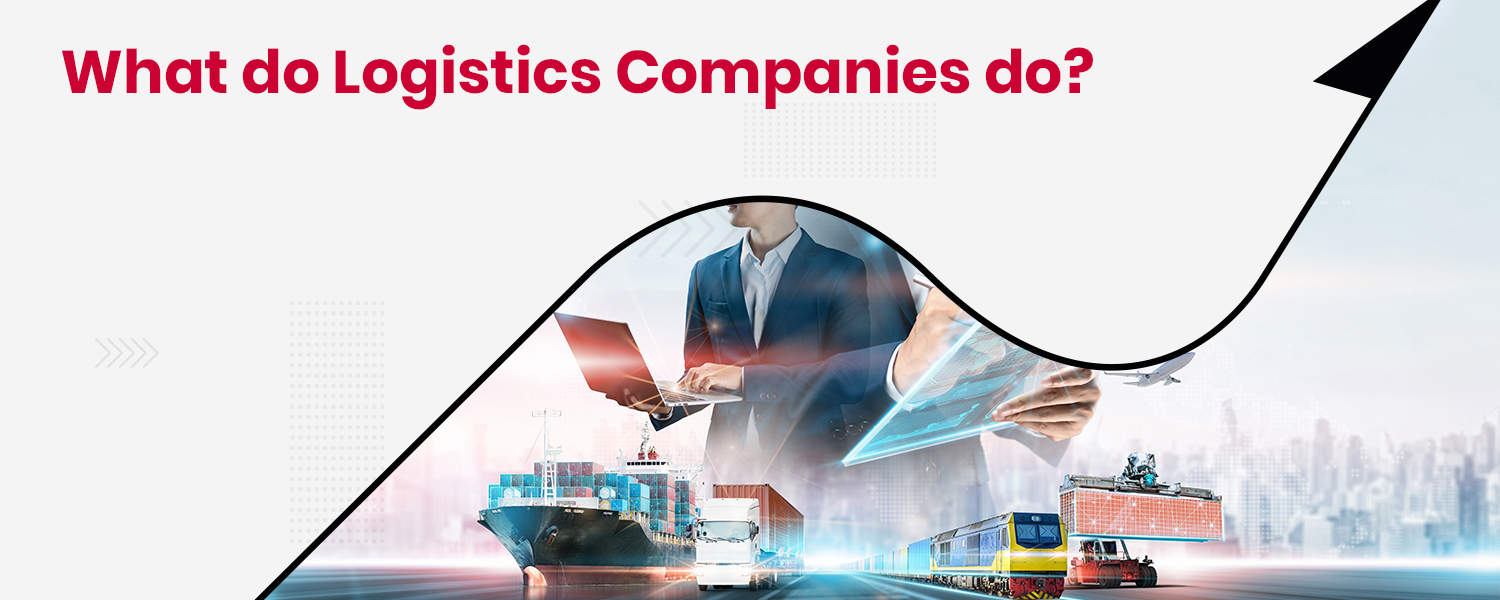Logistics can be the competitive edge for any business in a rapidly evolving, ‘I-want-it-now’ economy. With 10.7% of the world’s GDP tied up in logistics activities, businesses are now more interlinked globally than ever.
The essence of a business’s operation hinges on its logistics. And behind this, logistics companies have made it their mission to ensure that your company’s supply chain doesn’t just exist but thrives.
In this blog post, you’ll get to know the nitty-gritty of what a logistics company is and the functions it performs. We’ll explore how they’re increasingly the cornerstone of a business’s success and what makes them tick.
What is a Logistics Company?
A logistics company is essentially the linchpin that ensures a business’s products move from Point A to Point B swiftly, efficiently, and cost-effectively. While the general public may perceive logistics merely as ‘moving goods,’ the reality is far more multidimensional. A logistics company is an entity that transports goods and designs, controls, and expertly manages every nuance of a company’s supply chain. From the moment an order is processed to the last mile of product delivery, logistics companies are the keepers of efficiency and reliability.
Let’s say a company like DHL or FedEx is not just shipping your packages; they’re streamlining a complex ballet of information, goods, and financial flows that stretch from the factory to your front door.
What are the Types of Logistics Companies?
1: Full-service Logistics Companies
Full-service logistics is a one-stop shop that caters to all your logistical needs, from warehousing to transportation, inventory management, order processing, and even customer service.
These companies aim to be an integrated part of your supply chain, often using sophisticated software for real-time tracking and management. Their comprehensive range of services ensures that you can focus on your core business, leaving the complexity of logistics to them.
2: Freight Brokers
Freight brokers are the ‘matchmakers’ of the logistics, operating without owning any physical assets like trucks or warehouses. Their primary function is to facilitate a connection between shippers who need to move goods and carriers who can provide the required transportation.
3: Courier and Parcel Delivery Companies
Unlike full-service logistics providers who handle large volumes, these companies focus on expedited services for smaller parcels. Often seen as the ‘fast-twitch muscles’ of the logistics industry, they excel in express deliveries and time-sensitive shipments.
4: Third-Party Logistics Companies (3PL)
Third-party logistics companies, or 3PLs, are a hybrid model that typically provides specific logistics services. They might specialise in transportation, warehousing, or another aspect but usually don’t offer the whole gamut of logistics solutions.
5: Fourth-Party Logistics Companies (4PL)
If 3PLs are specialists, consider 4PLs the consultants of the logistics world. They generally don’t own assets or operate logistics services but manage and coordinate the entire supply chain. Fourth-party logistics providers often manage 3PLs, freight forwarders, and other logistics providers to optimise a business’s supply chain strategy from a top-down perspective.
Key Functions of a Logistics Company
1. Order Processing
Order processing is essentially the point where the theoretical meets the practical. This is the stage where customer demands are translated into actionable tasks, setting the tone for everything that follows.
Steps Involved
Order Receipt: The process begins with receiving the customer’s order.
Verification: Ensuring that the order complies with established terms and conditions.
Inventory Check: Confirming the availability of goods.
Order Scheduling: Determining when the order will be processed and fulfilled.
Documentation: Generating all necessary paperwork for record-keeping and compliance.
2. Materials Handling
Materials handling might seem rudimentary, but it’s the linchpin for a smooth and efficient supply chain. It ensures that goods are stored, moved, and retrieved in the most time-effective and cost-efficient manner. This maximises productivity, minimises handling time, and potentially reduces storage needs.
3. Warehousing
Warehousing serves as the strategic epicentre for storing goods near key markets. This reduces lead times and ensures a rapid response to market changes.
Choosing the right warehouse location is also about demographics, access to skilled labour, proximity to suppliers and customers, and local regulations.
4. Inventory Management
Inventory management is the delicate art of maintaining just enough stock to meet demand without incurring excessive carrying costs. Modern logistics companies leverage advanced inventory management software that uses algorithms and AI to forecast demand, analyse trends, and recommend reorders, thus optimising stock levels.
5. Transportation
Transportation is often the most visible and resource-intensive aspect of logistics. It’s often synonymous with logistics, but there is a clear-cut difference between logistics and transportation. Transportation is a subset of logistics filled with challenges like fluctuating fuel costs, regulatory restrictions, and unpredictable delays. Logistics companies often use software to optimise routes and improve fuel efficiency.
6. Packaging
Packaging is more than just ‘wrapping up’ products. It serves multiple purposes, from protecting the goods to marketing. There are several types: protective packaging, tamper-evident packaging, and retail packaging, to name a few.
7. Monitoring and Tracking
Monitoring and tracking are the eyes and ears of a logistics operation. Real-time data allows instantaneous decision-making, averting crises or seizing opportunities. Logistics companies use state-of-the-art tools, like RFID and GPS tracking, and sophisticated software platforms offering real-time analytics and reporting features.
The Role of Logistics in Business Success
The Synchronisation of Supply and Demand
One of the most critical functions of a logistics company is to bridge the gap between supply and demand. This is easier said than done, considering the complexities of today’s global supply chains. Efficient logistics can forecast demand, adjust inventory levels, and ensure a seamless goods flow from suppliers to end consumers.
How Logistics Contribute to Customer Satisfaction
Customer satisfaction is not merely a marketing metric; it’s also a logistics KPI. The three critical elements contributing to this are on-time delivery, real-time tracking updates, and quality assurance through effective packaging and handling. A well-organised logistics system ensures that consumers get what they ordered when they expected it, in the condition they expect it.
Efficiency and Cost-Effectiveness
Cost optimisation is the essence of effective logistics. It’s not just about cutting corners but about leveraging technology and analytics to create a lean, responsive supply chain. This includes using transportation management systems (TMS) to optimise routes and inventory management systems to reduce stock levels, lowering carrying costs.
The Significance of Strategic Planning in Logistics
Strategic planning is the backbone of any successful logistics operation. It involves carefully analysing and coordinating multiple facets like warehousing, transport, and inventory management. Strategic planning prepares businesses for the long term, making them resilient against market volatility and better positioned to seize new opportunities.
Adaptability and Scalability
A logistics system must be both adaptable and scalable. This flexibility is essential during unforeseen events like pandemics, natural disasters, or sudden market shifts. A robust logistics system can quickly scale operations up or down, ensuring businesses remain agile in responding to market demands.
Top Logistics Companies in India
Blue Dart
Blue Dart is one of the titans in the Indian logistics landscape, a subsidiary of DHL; it specialises in courier delivery services, including critical and time-sensitive shipments. The company offers many services, including air freight, shipping, and specialised medical courier services.
Blue Dart is renowned for its speedy and reliable service, offering next-day delivery to most parts of India. It also offers the Blue Dart Aviation dedicated air network.
Delhivery
Emerging as a disruptive force, Delhivery was founded in 2011 and quickly established itself as a comprehensive supply chain services company. From last-mile delivery to freight forwarding and warehousing, Delhivery offers a 360-degree logistics solution.
DTDC
Founded in 1990, DTDC is one of India’s oldest courier companies, with a significant global presence. DTDC offers domestic and international shipping, along with eCommerce logistics services. The company has one of the largest franchise networks, which enables it to reach even the most remote parts of India.
DHL
DHL is A global logistics giant and has a strong presence in India. DHL offers international freight forwarding, supply chain solutions, and express parcel delivery. Their global network and highly efficient services make it a preferred choice for international logistics. DHL is a leader in innovation with a focus on green logistics and smart trade solutions.
NimbusPost
NimbusPost specialises in providing tech-driven logistics solutions to eCommerce businesses. They offer domestic and international shipping, freight forwarding services, and integrated logistics solutions, including warehousing, last-mile delivery, courier recommendation engine, and shipment tracking.
Conclusion
Many see logistics as a behind-the-scenes operation focused on moving goods from point A to point B. However, as we’ve unpacked the true scope of what logistics companies do, you’ll agree it’s time to move this industry from the backdrop to centre stage in your business strategy.
But if you find it hard to finalise which logistics company is the best for your business, you can try NimbusPost’s recommendation engine. We recommend the best logistics company from the pool of 27+ courier services.
These companies are the beating heart that pumps life into eCommerce, healthcare, manufacturing, and every sector you can think of. They excel in the challenges that will help you coordinate intricate transportation schedules, optimise warehousing, and handle delicate goods.




